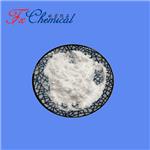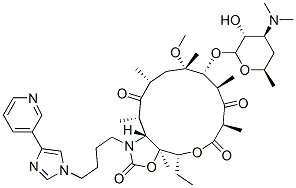Telithromycin---semisynthetic antibiotics
Telithromycin (Keteks, Sanofi-Aventis) is the first marketed member of a new class of semisynthetic antibiotics, the ketolides, structurally derived from erythromycin A. Ketolides (including telithromycin) are designed to overcome resistance to macrolides. These drugs retain the macrocyclic ring structure and the D-desosamine sugar at position 5 of erythromycin but, compared with the parent compound, lack the neutral sugar L-cladinose at position 3 of the erythonolide ring, which is replaced by a keto group (thus giving rise to the class name). Lack of the L-cladinose moiety results in better drug absorption and less gastric irritation through improved acid stability. Other differences include the presence of a methoxy group at C-6 and a large N-substituted carbamate extension at C-11/C-12.
Telithromycin received European Union regulatory approval in 2001 and Food and Drug Administration (FDA) approval in 2004. Since 2007, the clinical indications for telithromycin have been restricted to mild to moderate community-acquired pneumonia due to Streptococcus pneumoniae (including multidrug-resistant isolates), Haemophilus influenzae, Moraxella catarrhalis, Chlamydophila pneumoniae, or Mycoplasma pneumoniae for patients aged 18 years or older.
MECHANISM OF DRUG ACTION
The mechanism of action of telithromycin is similar to macrolides and is based on interaction with the peptidyl transferase site of the 50S ribosomal subunit – thus inhibiting the translation of rRNAs and preventing the elongation step of protein synthesis. In addition, telithromycin also interferes at an earlier stage of protein synthesis by disrupting the assembling of 50S subunit precursors to block the formation of a functional 50S subunit. The presence of a 3-keto group in place of the L-cladinose moiety allows telithromycin to bind to the ribosomal target in the 23S rRNA domain V without causing expression of ribosomal mutations. The large C-11/ C-12 carbamate extension provides an additional binding site at domain II. This dual binding affinity increases the binding affinity of telithromycin by approximately 10-fold compared with that of erythromycin. It is probably also responsible for overcoming resistance mediated by both the ribosomal mutations (erm) and efflux pump (mef) mechanisms. This leads to an enhanced activity against Strep. pneumoniae, including most macrolide-resistant strains. Additionally, in Gram-positive bacteria, ketolides act as inhibitors of 50S subunit formation. It is felt that the inhibitory effect on particle synthesis is of equal importance to inhibition of protein translation. The methoxy group at position C-6 provides increased acid stability compared with other macrolides, and is related to greater gastrointestinal stability.
Growing evidence indicates that macrolides exert immunomodulatory effects in addition to antimicrobial activity. These distinct effects are manifested at lower doses, usually after a relatively prolonged treatment (generally weeks to months), and in the absence of an identifiable, viable pathogen. These properties may be therapeutically useful in chronic airway inflammatory conditions such as asthma, chronic obstructive pulmonary disease (COPD), diffuse panbronchiolits, and cystic fibrosis. Given the structural similarities between ketolides and macrolides and the common capacity to reach high concentrations in inflammatory cells, immunomodulatory properties may also be hypothesized for telithromycin. So far, little information is available in the literature regarding this aspect. In a study conducted on healthy volunteers, telithromycin has been shown to reduce lipopolysaccharide (LPS)-induced monocyte production of potent pro-inflammatory cytokines such as interleukin 1a IL (1a) and tumor necrosis factor a (TNFa) . In a murine thigh model, telithromycin administration was associated with dose-dependent suppression of both IL-6 and IL-10. A recent animal study assessed the effects of telithromycin on in vivo and in vitro models of LPS-induced airway inflammation.
You may like
Lastest Price from Telithromycin manufacturers

US $0.00/kg2025-04-24
- CAS:
- 191114-48-4
- Min. Order:
- 1kg
- Purity:
- 0.99
- Supply Ability:
- 1000kg

US $0.00/G2025-04-21
- CAS:
- 191114-48-4
- Min. Order:
- 1G
- Purity:
- 98%min
- Supply Ability:
- 30kg/month

